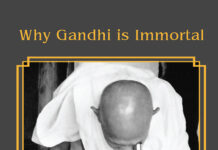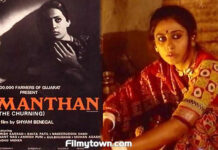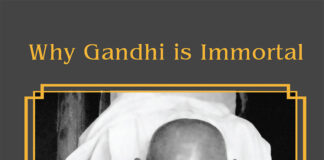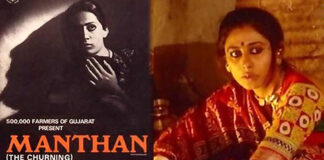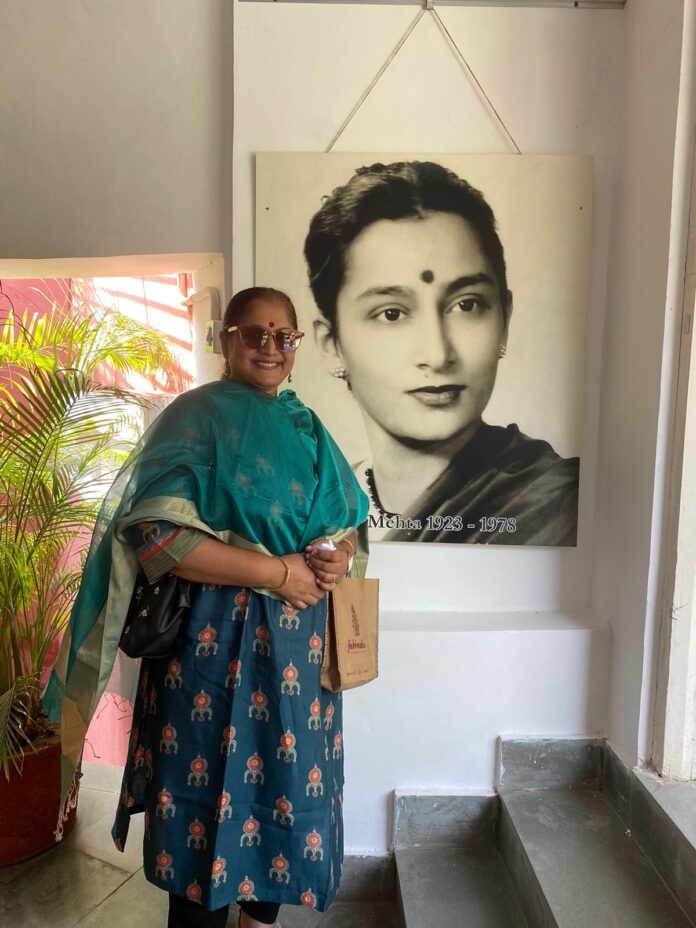
Rama Mehta’s Cornucopia
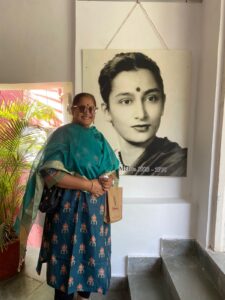
Am I in a Dream?
23 September 2023, I walked up the stage of the Vidya Bhawan Auditorium at Udaipur to receive this year’s Rama Mehta Writing Grant Award for English. Sara Rai, a scholar, author and translator, the granddaughter of the towering intellectual Premchand was on stage along with Vikram Seth, the renowned author, poet, translator and polyglot and Ajay Mehta ji, Rama Mehta’s son and trustee of the Rama Mehta Trust.
It was like walking in a dream. Just before he announced my name, Vikram Seth, shared some Chinese words to better explain the nuances of languages, something he had been explaining to the audience. We were all smiling because, hey who else in the room knew classical Mandarin? And moments later, I was accepting the framed certificate from him and Sara Rai and Priyanka smiling from the other side, and Ajay Mehta Ji standing just beside me. My hands were shaking – I think.
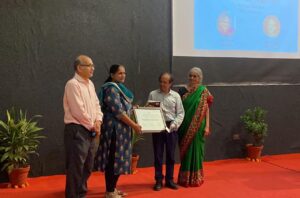
How did I walk into this dream? It began when a friend forwarded a poster – Rama Mehta Writing Grant had announced a short story competition for women writers in English, Hindi, Urdu and Rajasthani on the topic ‘Fear and Struggle’. I did have a Rajasthan connection which was a prerequisite for participation – my father was posted there for several years during which time we lived in Jodhpur and I studied in St. Patrick’s Vidya Bhawan. Apart from the competition I was really curious about Rama Mehta – who was she?
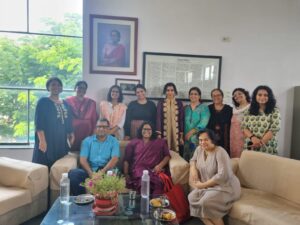
Who was Rama Mehta?
Who was this beautiful woman with limpid eyes and delicate smile whose black and white picture popped up on my screen? Rama Mehta – one of the first woman diplomats of India, an author, a sociologist, an influencer. Born in 1923 into a liberal family, Rama Mehta received education in India as well as abroad. At a young age of twenty six she joined the foreign service and was given independent charge as under-secretary of Iran, Afghanistan as well as the Americas. One of singular achievements was the signing of the first cultural agreement between India and US, signed in 1950 by Jawaharlal Nehru for India and Loy Henderson, the US Ambassador.
Rama Mehta left the service after her marriage to another IFS officer Jagat Mehta in 1951. Her marital family in Udaipur was conservative, the women observed purdah and other traditional practices which must have been quite new to the modern and western-educated Rama. However, she adopted the customs and traditions of the family with a mature understanding that change has to be brought in gradually and through an organic amalgamation of tradition and modernity. Her life and experiences in the Jeevan Niwas Haveli forms the basis of the iconic novel ‘Inside the Haveli’ published in 1977 for which she was awarded the Sahitya Akademi Award. Her other novels include ‘Ramu’ and ‘Keshav’ which were written as part of fellowship in Radcliffe, Harvard between 1964-65 and 1967-68. She also wrote for many newspapers as a regular columnist, attended many conferences as a sociologist and lectured at Sorbonne (Paris) in the summer of 1975.
Apart from her writing, Rama Mehta was committed to women’s education and welfare. Wherever she was, whether in Udaipur or Tanzania or Bhutan or China, she studied the lives of women and children. In Udaipur particularly she actively helped women in their pursuit of education and careers. This incredible woman passed away in 1978; she was only 54 years old. There was much more about her that I read and the more I read the more I felt ashamed that I had lived 50 years of my life without ever having heard about this magnificent woman. If nothing else, this competition had brought me closer to a remarkable woman of modern India and I would have been satisfied even with that much. But as things moved I realised that Rama Mehta’s cornucopia overflowed with gifts for women writers.
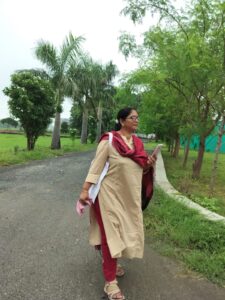
Four Days of Learning and Lifelong Friendship
A nightly email in June informed that I was shortlisted for the Rama Mehta Writing Grant and invited to attend the mandatory workshop in Udaipur between 20-23 July. The days passed very slowly – this was the first creative writing workshop in my life and it was like hopping around in new shoes, waiting for the first day of school.
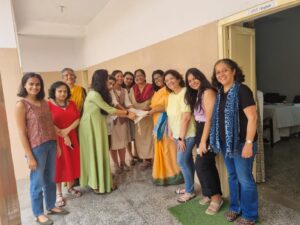
I met my first colleague in Delhi airport as we travelled together to Udaipur. This vastly talented and golden-hearted woman had to just wave with a smile and ask, “Aren’t you Paromita?” for the whole exercise to stop being a competition. By the time I had met Vagda Galhotra and then the rest of what, in my mind, I had started calling ‘The Shortlisted Gang’ and swapped stories with them, and by the time we had struggled with the Chinese miniaturist POV and twisted our brains to dish out a bawdy limerick, autorickshawed together to Hathipole and bargained for silver ear-rings, eaten dinner looking over the Lake Pichola to the shimmering City Palace beyond, by the end of four magical days competition had grown wings and flown out of the window.
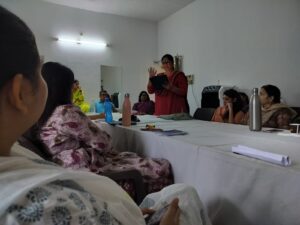
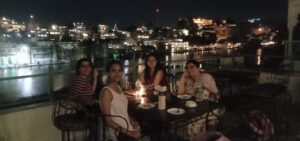
We were a bunch of really happy women amidst the green Aravalis, all our basic needs taken care of, with the sole responsibility of diving deeper into the world of literary creation, understand more about the art and craft of writing. Our mentors Dr. Anupama Mohan (English), Dr. C.P Dewal (Rajasthani), Dr. Ghazanfar Ali (Urdu) and Dr. Prabhat Ranjan (Hindi) taught, challenged, pushed, provided insights and issued warnings. Given that so many talented women are unable to express their creativity, the workshop was a precious gift of space and time. I came back from the workshop immensely happy to have found a peer group that cared and lots of things to think about in terms of bettering my writing skills.
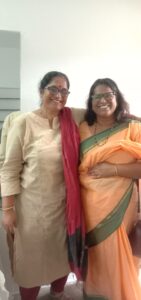
The Centenary Celebrations
On the last day of the programme, I was privileged to sit and listen to Sara Rai’s lecture on ‘Bhasha ki Jheeni Chadar’ – the fragile shawl of words. The auditorium was filled with spellbound people even as it poured outside. A small squirrel scurried back and forth across the wall behind Sara Rai as she spoke about the dilemma that many Indian authors face – should I write in English the coloniser’s language orin my mother tongue? Although she chose to write literature in Hindi, Sara Rai chose English for her memoir Raw Umber. She also talked about the importance of sounds – ‘the auditory is as important as the visual’ – in creating the word-image for readers. There was also a note of despair that in a nation with hundreds of languages and dialects, each with its unique richness, we are in an awful situation where there is pressure for ‘one nation, one language’, a part of the larger hyper-nationalist project. She remembered how her family continues to be greatly influenced by the values of her illustrious grandfather Premchand, which does not allow literature to be divorced from social and political realities of the day.
Vikram Seth’s speech continued where Sara’s ended. He pointed out that the dilemma Sara talked about is faced by multilingual societies across the world – the Swiss for instance, speak Swiss Deutche at home but High German outside. He also spoke in different ‘dialects’ of Chinese to explain how the same written symbol is pronounced differently in the two. He read out passages from George Eliot’s Middlemarch and then from Inside the Haveli – he was visibly moved by Rama Mehta’s writing and so were we. He was charming, erudite, wise and witty all at the same time. He spoke about languages and how the belief in Vasudhaiva kutumbakam – a philosophy that claims the entire earth is one family – contradicts the demand for ‘one nation – one language’. We must be able to embrace and celebrate all languages and literatures from across the world, he said. And in that spirit he brought in Ghalib and Faiz, Tagore’s Shesher Kobita, Pushkin, Bhagwati Charan Varma’s Bhaisagadi and many others.
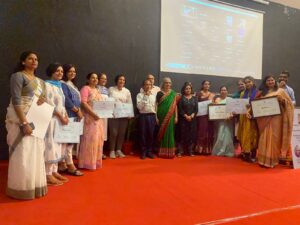
The announcement of winners was just a formality and yet I would be a liar to say that I was not eager to hear whose names came up. Madhuri for Hindi, Akhtar Bano for Urdu, Varsha Rathod for Rajasthani. English was announced last and hearing my name I walked to the stage like in a dream.
Sara Umber’s signed copy of Raw Umber is a prized memento of the afternoon. The beautiful certificate will soon be hung up on the wall right in front of my desk. My endless self-doubts are beginning to somewhat dissolve – although I cannot vouch that they won’t reappear another day.
What else can I say for my friends who will write for the Rama Mehta Competition next year and the years to come? Let me put it this way – there is life before Rama Mehta and there is life thereafter.
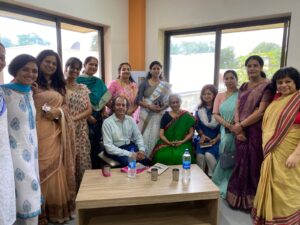
********************************************
I would like to express my gratitude to the Rama Mehta trust, all the trustees – Vikram Mehta ji, Vijay Khan Madam, Ajay Mehta ji, Aditi Mehta Madam, Neelima Khetan Madam for this innovative programme that they have conceptualised for women writers and to Priyanka Sarkar for putting her heart and soul into it. I am sure that the Rama Mehta Writing Grant will open doors for many aspiring women writers and do wonders in the literary field. I consider myself extremely fortunate that I could participate in the entire process; I hold on to the encouragement and the energy close to my heart as the writerly journey proceeds.
- Paromita Goswami
